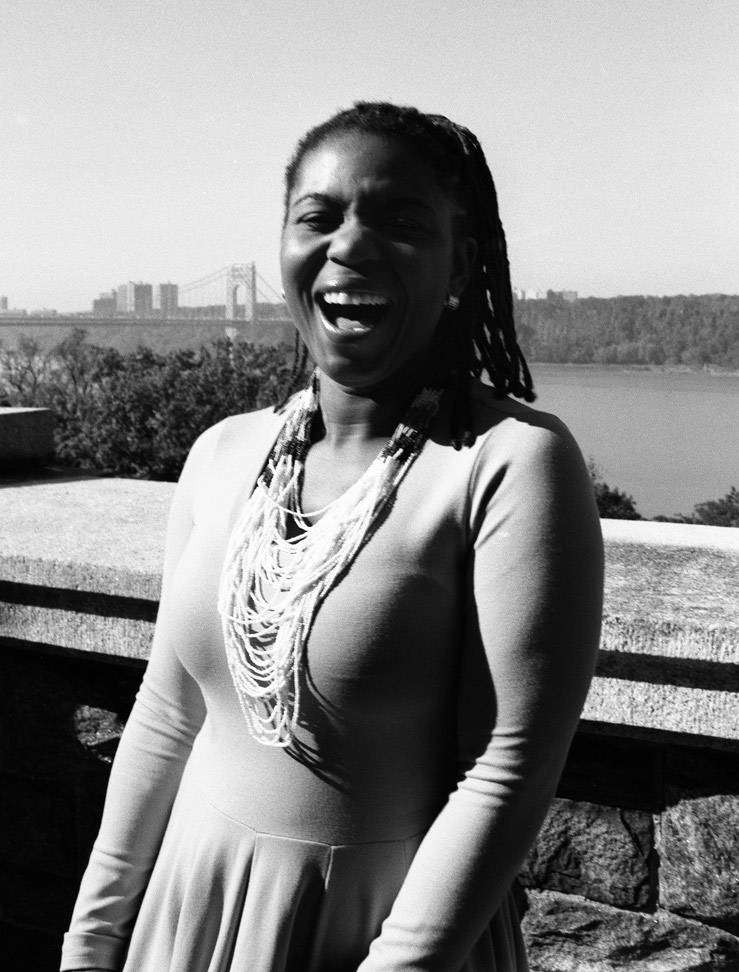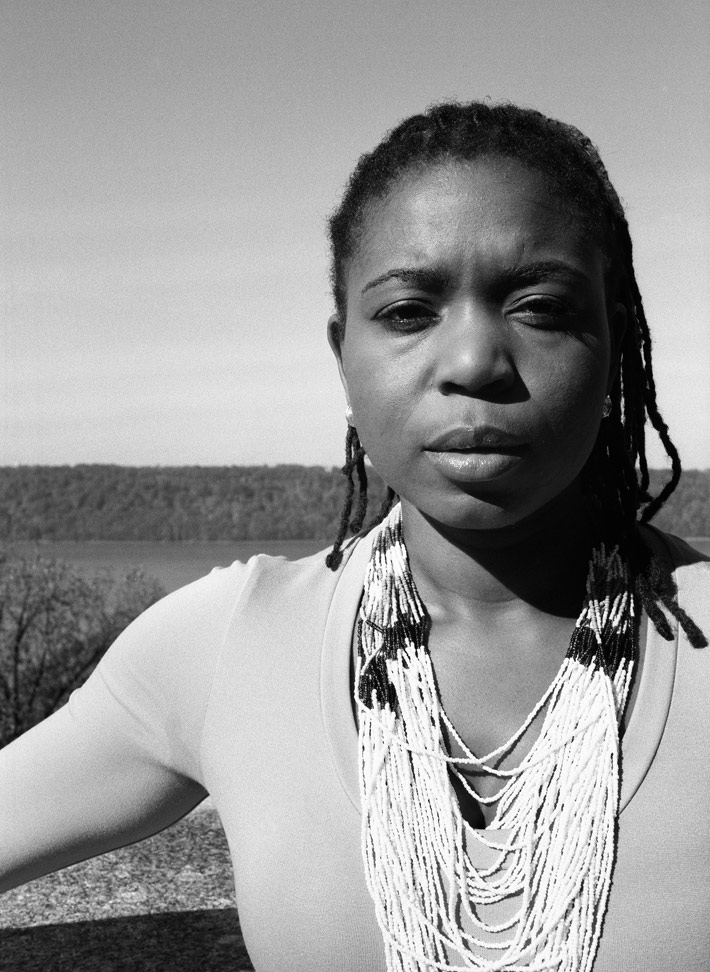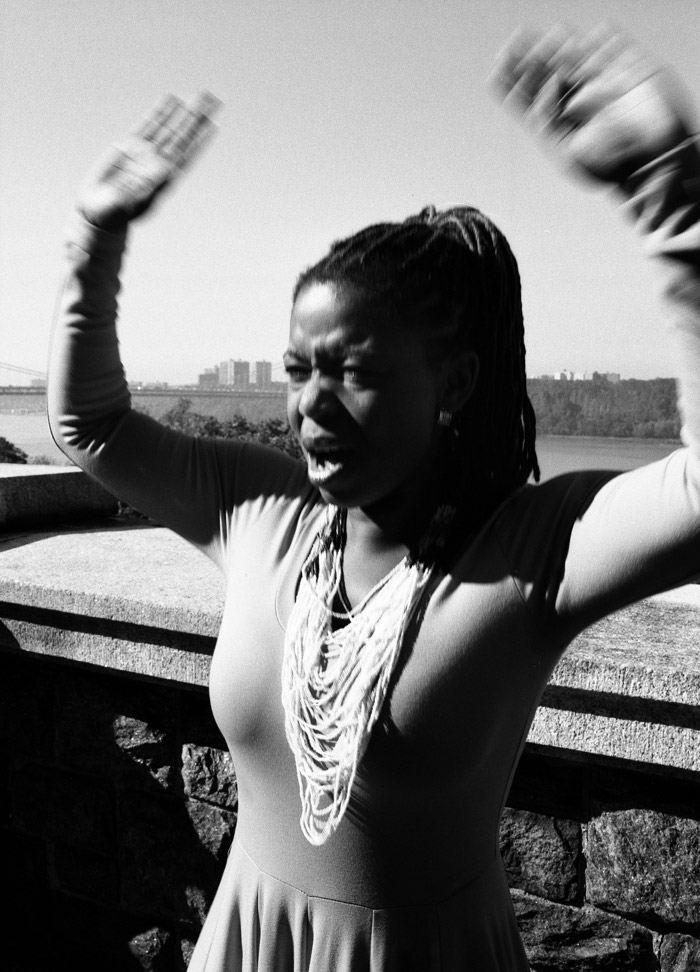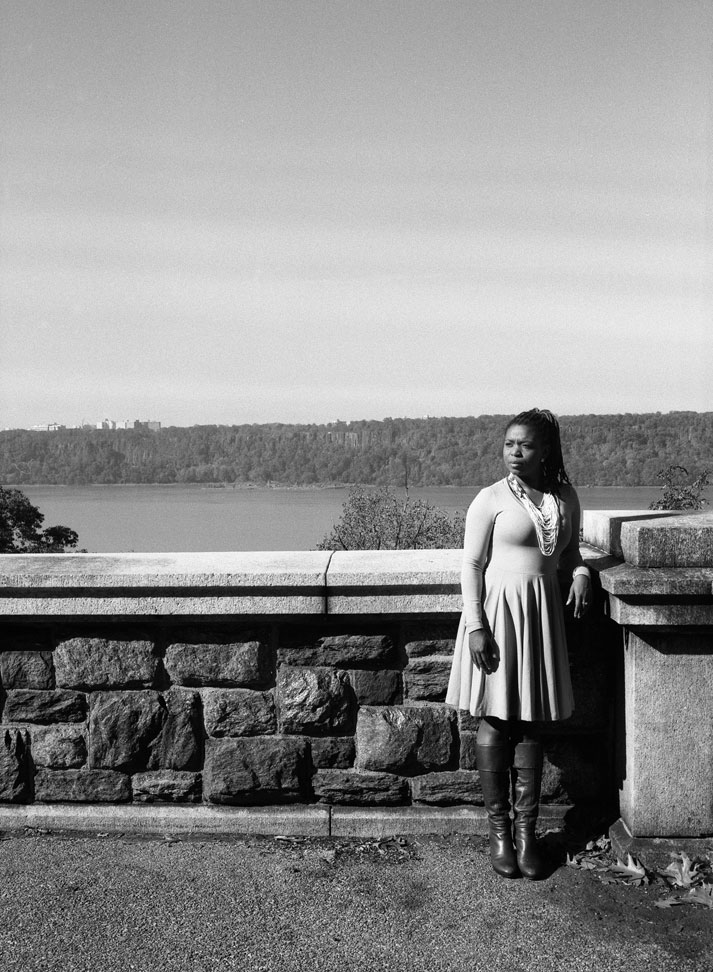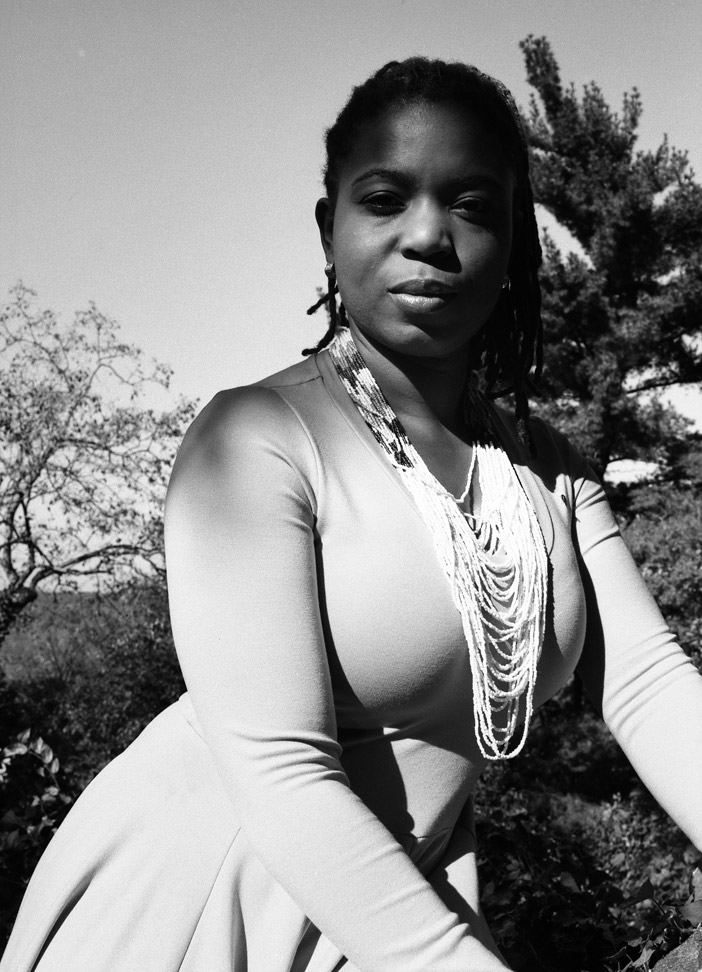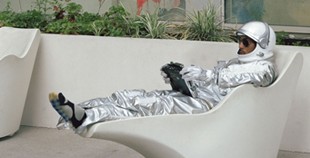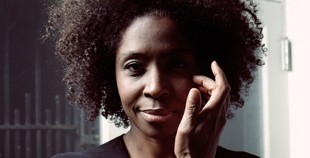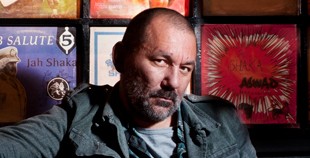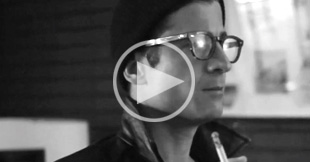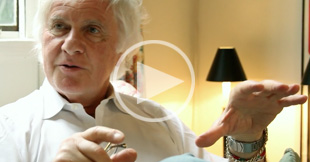
An interview by Tarrell Alvin McCraney, Playwright to Playwright
Photographed by James Graham
“They were just warm and vulnerable and embraced this moment, in a way I’ve never seen it. It’s the talk back I loved the most. It felt like a really safe space where a lot of them, most of them young, talked about religion, race…”
Playwright Katori Hall is not speaking about her Broadway debut of the play “The Mountaintop” which opened last fall starring Samuel L Jackson as Dr Martin Luther King Jr. and co-starring Angela Basset as a sweet, sharp and fast-potty-mouthed maid in room 306, the Lorraine Hotel, on the eve of King’s assassination.
No, while we speak, nestled into an empty dressing room, the technical rehearsal for that production goes on like a jazz riff over the dressing room speakers.
Katori Hall is speaking, dreamily, of a reading of “The Mountaintop” that happened in Russia.
“Russian audiences are really reserved.’
Hall learned this from her trip there in 2004 when, as a first year actor in graduate school, she was required to learn Russian and work with the Moscow Art Theater School. The experience, Katori noted, was riddled with racial tensions spurred a month earlier by an ambush of a black student by ‘skinheads’ while police unwilling to help simply watched. That story, and the sighting of Swastikas painted outside her dormitory walls, shook Hall and she ‘vowed never to return.’ But return she did, and with a play fictionalizing a history of violence and race in America.
‘They were authentic to the moment and the truth of the moment. It allowed for an interesting conversation about leadership. Where it comes from? That’s the sort of talk back I want to have in America.”
Ms. Hall is getting her chance.
Her play “Mountaintop” did a 360-lap around the world, starting first as a reading/workshop at the Lark Development Play Development Center. The Lark also awarded Hall the PONY Award, which allowed her a year of free housing in a one bedroom, doorman’d apartment in the heart of the theater district in New York City.
From the Lark, the play moved to Theatre 503, a small theater in London that sat directly over a pub. Ms Hall was quoted as saying ‘Well, OK, all great theatre is done above a pub.’
From there, Mountaintop transferred to Trafalgar Studios on London’s West End starring David Harewood and Lorraine Burroughs, and won Ms. Hall the Oliver Award that year for best new play. She made history, becoming the first black woman to receive that award.
Then there were various readings of the play around the world, and finally the stop in Russia again thanks to the Lark Center.
“It was perfect; supposedly there are two actors of color being hired In Russia and they just happened to be perfect ages. In a weird way sometimes I say that was a perfect version. The guy (actor) was really short. And king was like 5’6 or something. It was kind of remarkable Even though they were using these Slavic syllables to put forth my lilting southern dialogue.”
Shortly after winning the Olivier, the play was signed for a Broadway run by producers Jean Domounain and Sonia Friedman.
And all of this took place before she turned 30.
“I’m 30, look 20, and act five,” she laughs
Don’t let her contagious guffaw and her trickster smile fool you.
Katori Hall is even-tempered and easy to get along with. Too, she’s beautiful. High cheekbones, a head full of curly locks that she tosses up and down at a whim. Her easy self-deprecation and light Memphis cadence could lead you to believe her a high-fiving happy-go-lucky. Instead, Ms Hall is a focused woman in the business of creating complex portraits of herself and the world around her.
“I want to be emerging always. I’m in a transitional period with my identity
I’m a young black woman but who is Katori Hall beyond that?”
Raised in Memphis Tennessee, Hall was the youngest of 4. She began working as an actor at a young age. She recounts having Dreams of New York and a life far away. So it should come as no surprise when asked what her favorite role would be she mentions Anton Chekov’s play ‘Three Sisters’, a classic drama about three siblings who long for a life that is quickly slipping away from them.
“I saw their experience in my family; related on a human level. We had an Olga and a Masha. I wanted to be one of three sisters in Chekov’s beautiful play.”
At Columbia, Ms. Hall thought she might have a chance to play Irina the youngest sister who dreams of a chance to move to Moscow. But she was met with a roadblock and didn’t get the part.
“I was killing Irina. I thought I was tearing that audition up. And I confronted the head of the department who was directing the play and she said she wanted all of the family to look alike. Oh I get it,” Katori said. “You don’t want three sistuhs.”
We laugh but the wound was serious. And met with complimentary pangs.
“I ended up taking this acting class (while at Columbia) and our assignment was to take your acting partner, my acting partner just happened to be another young black woman, and find roles for your type and we pulled down so many plays.”
Finding not much hope, Katori and classmate turned to timely yet repeatedly-used classics. Lorraine Hansberry’s “A Raisin in the sun”
“We can’t both play BENEATHA. And we too young to play MAMA.”
Arthur Miller’s “The Crucible”
“Should we split the role of TITUBA?”
“We were frustrated and went back to class and we were like, ‘Becky, Becky Do you have any suggestions?’ That woman stood there… ten seconds went by, 20 seconds went by, 40 seconds went by.
In that moment when I saw my teacher silent I realized…If I really want to see myself in all my beauty and complexity staring back at me I would have to do it myself.”
And do it she did. After graduating from Columbia Katori enrolled in the American Repertory Theatre Institute for Advanced Theatre Training at Harvard University, and from there the Juilliard School’s Lila Acheson Wallace playwriting program.
“Since I left school I’ve written about ten plays that are at various stages of the process. “
THE WORK
There is Hoodoo love, which was developed and premiered at the Cherry Lane Theater under the mentorship of Lynn Nottage, Pulitzer Prize winner for her play “Ruined.” Hoodoo Love is a blues-rich heartbreaking depiction of a young black woman, “Toulou,” in late depression era Memphis, Tennessee. Time out called the play ‘a major debut by a playwright with a spring in her step, as well as kick.’ Katori calls it a search for her song:
“I was writing about myself. I had moved to this city of dreams. Had my brush with romance.”
Like Toulou Hall wondered
“What do you make of negative energy how do you sublimate it?”
Hall called the experience writing Hoodoo
“Transformative: Okay I am a storyteller now.”
In early 2011 Katori was the recipient of the Susan Smith Blackburn Prize for her play “Hurt Village” a non-flinching look at life the Uptown projects in Memphis. Our guide through “Hurt Village” is COOKIE; a rapper in the making. 13-year-old COOKIE tries to navigate the changing landscape as a Hope Grant, designed to ‘transform’ pubic housing, threatens to relocate her, her mother CRANK and Great Grandmother BIG MAMA. This on the eve of a drawdown in American forces in Iraq, which, leads to the reappearance of COOKIE’S estranged soldier father BUGGY. “Hurt Village” is one of three plays by Hall that the Signature Theater in New York has guaranteed to produce as apart of her five-year residency.
Hall on “Hurt Village”
“It’s actually my favorite. Based on a real place. That movie ‘Blindside’ portrayed this community, made it seem as if every black man on the corner was the boogieman.
But there are complexities; there are stories there. I think the play is so layered and also fun. Its great hearing the ensemble come together to do it.”
Describing the growth and development of 13 year-old COOKIE in the world of the play, Hall smiles:
“Emotional growth could get stunted because you were forced to grow your own self up so fast.”
And then there’s “Pussy Valley”.
“Pussy Valley” is being birthed.” Katori says throwing her head back and laughs as thunder cracks over the speakers from the rehearsal stage downstairs. Katori hall is still a performer. She smiles as she begins to talk her newest play.
“I would go to those… you know in the subway what are they called you see ‘em… news stands and you see King magazine and the XXL and these Black and Latin women are just there basically naked and they have all these black bars over ‘em. But then right next to them in Elle are these white women, just as naked, but her beauty is something that is ultra feminine ideal, where as the black woman is just nasty so we have to cover her parts. What is that? Why is that? How can I articulate this difference while also being entertaining? Put them in a strip club and see what a black woman has to go through as she tries to express her sexuality. It’s like a cousin of “Hurt Village” peeling back sexuality as it pertains to the Black woman. It requires actors who can really pole dance.“
She smiles excitedly about this and looks really interested in the investigation. It seems that Katori Hall’s charge to add exciting and complex roles for black females in the American theater is a perfect fit; a job that she’s not only good at but fully enjoys. Her demeanor shifts when asked about finding actors for roles and the long struggle to cast “The Mountaintop” on Broadway.
“I’m just glad we got it cast and it’s going up. I ended up getting a lot of flack for casting these,” She uses air quotes, “stars in the show. Face book fights would break out about the casting. But I lucked out. They can do the part well and they have box office draw.”
Asked her why she thinks so many facebookers were offended
She shrugs. Purses her lips. Then in a knowing sigh answers, “Scarcity of roles. There are not a lot of roles. And performers think that Broadway is the Holy Grail, as if they aren’t anyone unless they perform on the Great White Way, and that’s unfortunate, I don’t think that’s true. I think some of the best theater is going on regionally, the best theater is happing off Broadway. I think People need to stop being myopic and stop feeling as though this defines success. It’s a part of it, these lights…”
If you watch her close you can see by her evenness and calm that Katori Hall is already thinking, planning, maybe penning her next plays, films, songs. She currently has three plays running: “Hurt Village” at the Signature Theater, “WHADDABLOODCLOT!!!” Which opened at the Williamstown Theater Festival, and “Children of Killers” about the Rwandan genocide, which opened Friday at the Castillo Theater on West 42nd Street in New York City. ‘She’s on to the next,’ as they say. But that doesn’t stop Samuel L and Angela Basset from filling the dressing room with shouts of this marvelous playwright’s words. Over the din I ask.
What about your family? How do they feel about the work?
‘My mother has a response to this play (Mountaintop). She feels I got the story in an emotional way. I’m curious to see what they think of “Hurt Village”, though. I’m speaking for them and I’m interested in knowing if what I am saying is what they want an audience that don’t look like them to hear.
Angela Basset’s lines beam through speakers: ‘Fuck the White man fuck ‘em… Oh I’m sorry Preacher King.’
Katori Hall smiles.
